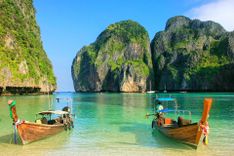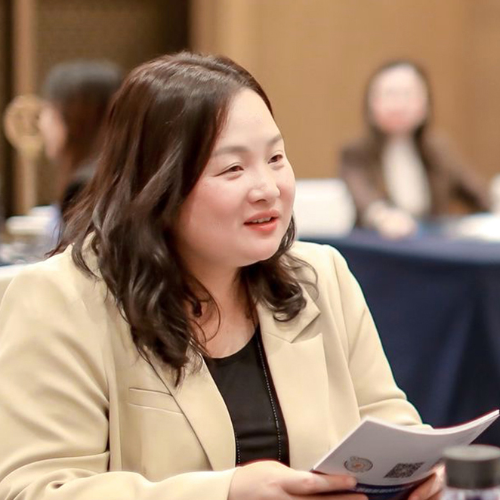- Religion & Spirituality
- Asia
- Thailand
- Bangkok
- Chiang Mai
- Inspiration
Thailand isn’t just about neon-lit markets and full-moon parties — it’s also one of the best places to hit pause. Whether you’re a seasoned meditator or just desperate for a digital detox, the country’s meditation retreats offer a real chance to unplug. From silent Vipassana courses in Chiang Mai to beachfront mindfulness in Koh Samui, there’s a retreat for every level of commitment (and tolerance for early mornings). Expect simple living, challenging self-reflection, and — if you’re lucky — a moment of actual inner peace. Just be warned: 4 a.m. wake-up calls and monk-led chanting sessions are all part of the deal. Ready to reset?
Rules at Thailand's meditation retreats
Thailand has hundreds of meditation temples, but only a few offer structured retreats in English. These spiritual retreats are suitable for beginners and experienced meditators alike, providing an opportunity to take your mind off of everyday life and immerse yourself in mindfulness.
What to expect from a spiritual retreat in Thailand
Most meditation retreats in Thailand teach Vipassana, or “insight” meditation, which focuses on observing internal sensations. Another common practice is Samatha, which calms the mind and builds concentration. Both techniques require patience, discipline, and an open mind.
- Beginner-friendly retreats – Wat Suan Mokkh and Wat Khao Tham are well-known for their structured programs led by experienced Thai and Western teachers. Sessions include meditation practice, Buddhist teachings, and one-on-one guidance.
- Strict schedules – Expect 4 a.m. wake-up calls, hours of silent meditation, chanting, and daily chores. Reading, writing, and unnecessary conversations are discouraged.
- Separation of genders – Men and women have designated areas and do not interact. Some retreats also enforce a vow of silence.
- Modest dress codes – Loose, conservative clothing is required. Some retreats ask you to wear white; check in advance whether you need to bring your own.
- Buddhist precepts – Most retreats follow eight key rules, including no eating after midday and abstaining from alcohol, tobacco, drugs, and sex.
Accommodation is simple — think dorm-style rooms, mats on the floor, and basic meals. Most retreats only ask for a small daily donation (around $5–6) to cover food and lodging.

Meditation in a retreat center © Molfar/Shutterstock
Where to find more information on meditation retreats in Thailand
Planning a meditation retreat in Thailand? There are a few great resources to help you find the right retreat and understand what to expect.
- Dhammathai – A comprehensive site with details on meditation retreats across Thailand, plus practical advice on Buddhist teachings and practices.
- Little Bangkok Sangha – A blog run by British-born monk Phra Pandit, featuring updates on meditation talks and retreats in Bangkok.
In Bangkok, keep an eye on the Buddhadasa Indapanno Archives in Chatuchak Park. This center, built in honor of the founder of Wat Suan Mokkh, may offer more meditation events in English in the future.
Looking beyond meditation? Check out our list of unmissable experiences in Thailand.
Best meditation centers and retreat temples in Thailand
Thailand has a rich tradition of meditation, with numerous centers offering retreats for all levels. Whether you're looking for an intensive Vipassana course or a short mindfulness session, these temples and meditation centers provide a structured space for practice.

Phra That Si Chom Thong Temple , Chiangmai, Thailand © panda3800/Shutterstock
Insight Meditation Centre, Bangkok
The House of Dhamma in Bangkok’s Jatujak District is a small but dedicated space for meditation and mindfulness. Here, you can learn Vipassana (Insight Meditation), Buddhist Mindfulness, and even Reiki healing.
- Offers regular two-day Vipassana courses and one-day Metta (Loving-Kindness) meditation workshops.
- Additional courses in Reiki and other mindfulness practices.
Wat Mahathat, Bangkok

Wat Mahathat © huihyper/Shutterstock
This 18th-century temple provides a welcome break from Bangkok’s tourist crowds and an opportunity to engage with monks studying at Mahachulalongkorn Buddhist University. While the temple itself isn't a retreat center, its Vipassana Meditation Centre offers daily meditation sessions.
- Daily Vipassana meditation practice: 1-4 pm and 6-8 pm.
- Monk-led sitting and walking meditation, plus chanting and dhamma talks.
- Some English-speaking monks are available for guidance.
- A second center, "Meditation Study and Retreat Center," operates nearby but is less focused on foreign visitors.
- More information: Visit the official website of Mahachulalongkorn Buddhist University for details on meditation programs.
For the most up-to-date schedules, it's best to visit the temple in person or check meditation forums and travel blogs.
Wat Pah Nanachat, Ubon Ratchathani
Founded in 1975 by the revered monk Ajahn Chah, this forest monastery is specifically designed for non-Thai speakers, with English as the main language.
- The atmosphere is intense and disciplined — best suited for serious practitioners, not beginners.
- Visitors must write in advance to request accommodation, with several weeks needed for a response.
- Meditation practice follows strict monastic traditions, including long periods of silence.

Buddha in Wat Phra That Si Chom Thong Wora Wiharn, near Chiang Mai, Thailand © Valery Shanin/Shutterstock
Wat Phra Si Chom Thong Insight Meditation Centre
Located 36 miles south of Chiang Mai, this temple is an important site for Vipassana meditation and home to the Northern Insight Meditation School.
- Founded by Phra Ajarn Tong Sirimangalo, a highly respected teacher.
- Courses range from 4 to 21 days, taught in English, Thai, and some European languages.
- Visit their official website for up-to-date information on courses and costs.
Mahachulalongkornrajavidiyalaya Buddhist University, Wat Suan Dork
This temple offers introductory meditation retreats with insights into Thai Buddhist culture.
- Retreats begin on Tuesdays at 1 pm, with activities like yoga, chanting, and almsgiving.
- The program includes an overnight stay at the training center, returning the next day.
- Costs B300–500 ($8–14 USD) — check their website for availability as courses are sometimes canceled.
Northern Insight Meditation Centre, Wat Ram Poeng
Wat Ram Poeng, also known as Wat Tapotaram, offers structured Vipassana courses with strict discipline.
- Silence is enforced, along with a no-food-after-noon rule.
- Minimum stay is 10 days, with a basic course lasting 26 days.
- Courses are donation-based, led by Thai monks with translation available.
World Fellowship of Buddhists (WFB)

World Fellowship of Buddhists, Bangkok Thailand © Kittipong Chararoj/Shutterstock
With 85% of Thailand’s population practicing Theravāda Buddhism, the World Fellowship of Buddhists (WFB) serves as an international hub for Buddhist studies and meditation.
- Founded in 1950, with headquarters in Bangkok (Benjasiri Park, Sukhumvit Soi 24).
- Open to all Buddhist traditions, with regional centers in 35 countries.
- Offers meditation sessions and resources for those interested in Buddhist philosophy.
Planning your first trip to Thailand? Read our essential travel tips before you go.












